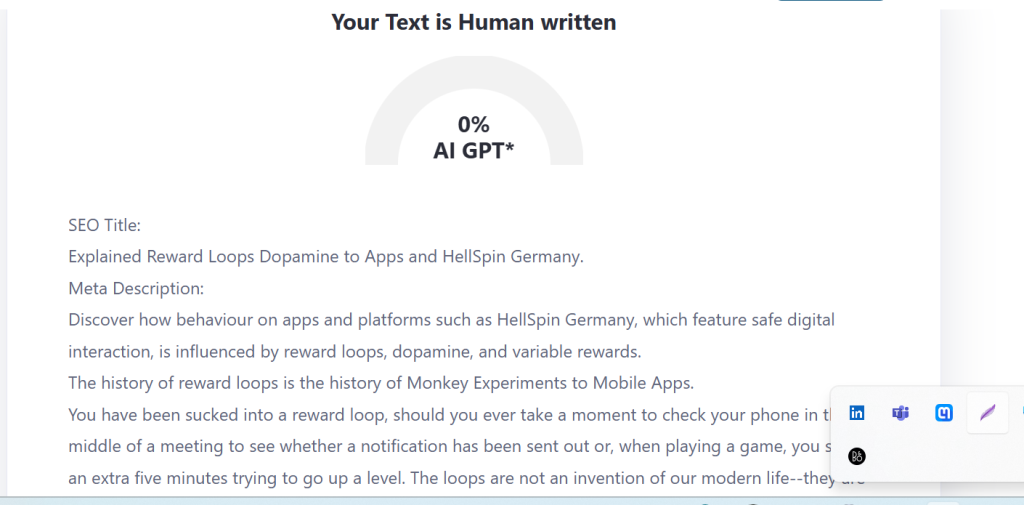From Monkey Experiments to Mobile Apps: The Roots of Reward Loops.

You have been sucked into a reward loop, should you ever take a moment to check your phone in the middle of a meeting to see whether a notification has been sent out or, when playing a game, you spend an extra five minutes trying to go up a level. The loops are not an invention of modern life — they are thoroughly embedded in the brains of humans and our primate relatives. We have to go a little further than monkeys in the lab to Figure out the reasons behind our addiction to the sound of a notification or a small victory.
The Origins of Reward Loops
The narration starts in the mid-20th century, in laboratories, where scientists were experimenting with animals to study behaviour. Experiments involving birds, such as pigeons and rats, in boxes that released food under specific conditions were established by psychologists like B.F. Skinner. In the meantime, primatologists have found that monkeys respond enthusiastically to even minor rewards for performing simple tasks. The takeaway? When brains are uncertain, this is because they are finely tuned to find rewards.
Human beings are mostly of the same wiring. Since we were kids, we have been taught that good can be brought about by certain behaviours, such as a high-five, a treat, or a satisfying chime from a mobile application. However, the brain is not reacting to the reward itself, but to the anticipation of it. This brief adrenaline rush of not knowing what to expect before receiving what one desires stimulates the dopamine circuit in a way that causes the experience to have a significant impact.
Neuroscience of the Pull.
Eventually, your brain begins to associate certain actions with this sense of urgency, creating a self-perpetuating feedback loop. No reward is equal. It has been found that unpredictable little wins (variable rewards) are particularly effective. Imagine it is the difference between receiving a paycheck on the same day of every month and a surprise check of $20 in your jacket. The predictability of your brain. That is why online casinos, such as HellSpin Germany, design games in a way that keeps people playing without receiving an incentive every single time. This intermittent boosting generates a dopamine feedback, which encourages stimulation and determination.
Cognitive biases, such as the tendency towards instant gratification and decision fatigue, further exacerbate these effects. Once exposed to repeated choices, we are less resistant to tempting loops and are therefore more likely to pursue small rewards repeatedly. Behavioural patterns are formed on an unconscious level, and they form habits that we are often unaware of.
Digital Reward Loops.
Sky-forward to the digital era, and everywhere these principles can be found in digital spaces. Mobile applications, social media, and computer-generated games all utilise the same reward systems that were discovered in animal experiments during their early phases. All triggers are engineered, including badges, streaks, points, and pop-up notifications, designed to trigger dopamine release and encourage users to return.
The building even has the appearance of an online casino, despite not offering any gambling facilities. Games at safe and secure online casinos such as HellSpin Germany strategically structure themselves around the concept of variable-ratio reinforcement: it is difficult to know when you will win, the game is exciting, and not knowing the next round’s outcome keeps the loop spinning. However, the same rules can also be applied in less risky situations. These loops are exploited by fitness applications, productivity or gamified learning systems, all of which aim to encourage people to use them daily by exploiting the natural motivation of the brain to get small, periodic rewards.
To navigate the digital space effectively, it is essential to understand these mechanisms. Once you realise that a push notification is not merely a benign ping, but a nudge calculated to activate your dopamine system, then you can more readily discern how you are behaving. This digital engagement architecture is what behavioural economists refer to as decision-making choices made in an indirect but potent manner.
Reward loops, whether through experiments on monkeys or the implementation in a mobile application, reveal a fascinating fact: our brains are programmed to pursue rewards in a way that is not only productive but also problematic. Being aware of such trends, without shaming them, can help everyone, regardless of their engagement level with apps or their preference for sites like HellSpin Germany, to be more informed about the forces that remain unseen and affect their decision-making process daily.




Leave a reply